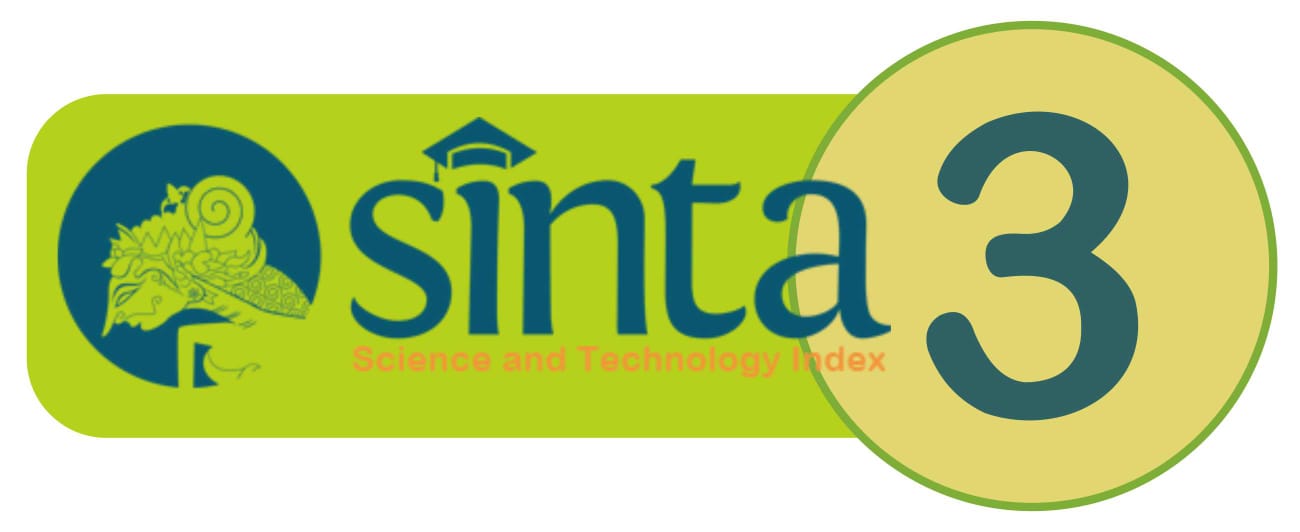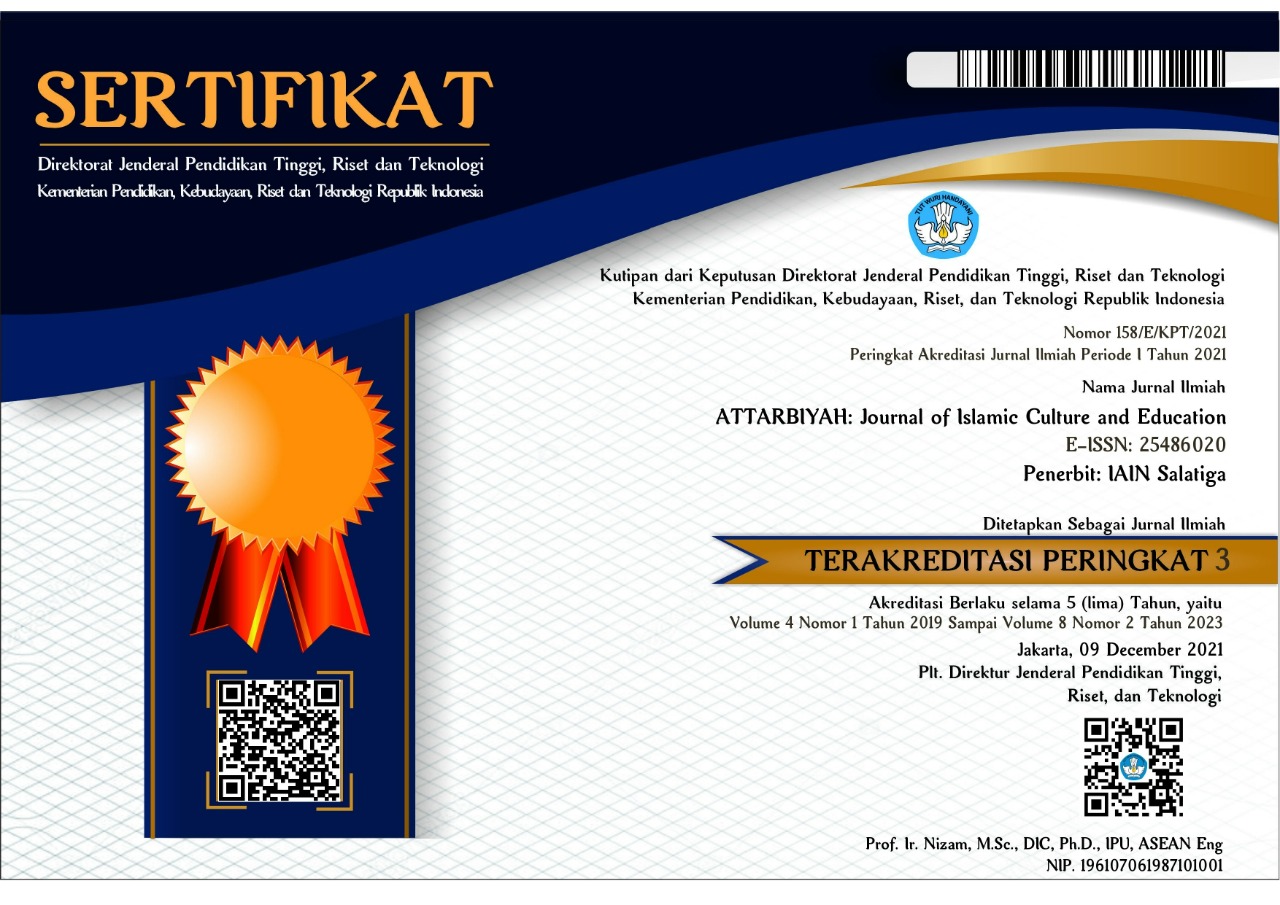A model for integrating Islamic values and local contexts into mathematics instruction for secondary students
Abstract
Islamic integrated instruction connects the teaching of knowledge, concepts, and skills in a particular subject matter with the Quran and the Hadith to promote desirable characteristics in Aqidah, Ibadah, and Akhlaq. This study formulated a model for integrating Islamic values and the contexts of Thailand’s three southern border provinces (Deep South) into mathematics instruction for secondary students. The constructed approach comprised learning activities administered in six steps, including 1) attention-grabbing, 2) presenting contents, 3) validating, 4) building awareness, 5) practical training, and 6) presenting outcomes. Suggestions included teachers exploring and utilizing Islamic content relevant to lessons or local contexts for lessons less related to Islamic knowledge and allowing students to recognize presented mathematic and Islamic bodies of knowledge for further connections to their daily lives.
Keywords
Full Text:
PDFReferences
Alqudah, D., Bidin, A., & Md Hussin, M. A. H. 2019. The Impact of Educational Infographic on Students’ Interaction and Perception in Jordanian Higher Education: Experimental Study. International Journal of Instruction 12(4): 669-688. https://doi.org/10.29333/iji.2019.12443a
Badarudin. 2019. Literacy Movement Read Al-Quran through Habits of Reading Fifteen Minutes Every Day. 4th Progressive and Fun Education International Conference (PFEIC 2019): 11-15.
Bahroni, I. 2010. Integrated Islamic Education: An Analytical Study on The Concept and Practice of Gontor System in East Java Indonesia. Jurnal TSAQAFAH 6(1): 81-112. http://dx.doi.org/10.21111/tsaqafah.v6i1.140
Baka, M, & Narongraksakhet, I. 2010. Development of the Integrated Curriculum Framework for Level 3 for Islamic Private Schools in the Southern Border Provinces. AL-NUR Journal, Graduate School, Yala Islamic University 5(9): 67-82.
Colina, N. & Listiana, A. 2020. Al-Quran Based Learning in Early Childhood Education. Proceedings of the 5th International Conference on Early Childhood Education (ICECE 2020): 19-22.
Ekkapan, P. & Thongmoon, M. 2020. The Development of Mathematics Literacy for Mathayomsuksa 5 Students in Graph Theory Section Using Context-Based Learning. Journal of MCU Nakhondhat 7(9): 111-125.
Gilbert. 2006. On the Nature of “Context” in Chemical Education. International Journal of Science Education 28(9): 957-976. https://doi.org/10.1080/09500690600702470
Hakim, L. 2012. Internalization of Islamic Values into the Formation of the Attitudes and Behavior of Students of integrated Islamic Primary School Al-Muttaqin Tasikmalaya. Jurnal Pendidikan Agama Islam-Ta’lim 10(1): 67-77. http://dx.doi.org/10.23887/jpi-undiksha.v10i4.30328
Halstead, J. M. 2007. Islamic Values: A Distinctive Framework for Moral Education? Journal of Moral Education 36(3): Islamic Values and Moral Education.
Hidayat, R. A., & Wijayanto, Z. 2020. The Effectiveness of Cultural Context-Based Mathematics Student Worksheets (Lks) Toward Elementary School Students Learning Outcomes. Ilkogretim Online - Elementary Education Online 19(2): 34-41. https://doi/org/10.17051/ilkonline.2020.02.104
Kaewsaensai, K., & Kijkuakul, S. 2021. Development of Context-Based Learning Guideline in the Topic Probability of Grade 10 Students. Journal of Yala Rajabhat University 16(1): 42-51.
Kharbach, M. 2012. Ways to Teach Using Infographics. Retrieved April 3, 2014 from www.educatorstechnology.com/2013/02/ways-to-teach-using-infographics.html
Kusaeri, L. U., Sadieda, T., Indayati, & Faizien, M. I. 2018. Developing An Assessment Instrument of Higher Order Thinking Skills in Mathematics with in Islamic Context. Journal of Physics: Conference Series 1097: 1-7.
Lateh, A. 2019. Reflective Teaching of Mathematics Course in the Context of Muslim Quota Classroom at Demonstration School Prince of Songkla University, Research Methodology & Cognitive Science 17(2): 164-179.
Listyono, Supardi, Saeful, & Wiyanto. 2018. Metode Menanamkan Nilai Religius Dalam Rencana Pembelajaran Biologi. Seminar Nasional Pendidikan Biologi Dan Saintek III 482-489.
Masduki, Khotimah, & Sutarni. 2014. Islamic Values in Mathematics Learning. International Conference on Research, Implementation and Education of Mathematics and Sciences, Yogyakarta State University, 18-20 May 2014: 359-369.
Mualimin, B Subali. 2018. The Integration of Al-Qur’an and Hadith Studies on Biology Learning at Islamic Senior High Schools in Magelang Indonesia. Journal of Physics: Conferences Series 1097: 1-8.
Narongraksakhet, I., Wae-u-seng, N., Yeesunsong, A., Saa, K, & Langputeh, S. 2010. Needs assessment for developing curriculum guidelines for TADIKAs and Pondoks. Pattani: Prince of Songkla University.
Nuriman & Fauzan. 2017. The Influence of Islamic Moral Values on the Students’ Behavior in Aceh. DINAMIKA ILMU 17(2): 275-290. http://dx.doi.org/10.21093/di.v17i2.835
Nurkhamimi, Z. Rozhan, M. I. & Ahmad Farid, M. J. 2016. Integration of Naqli (revealed) knowledge and Aqli (rational) knowledge in postgraduate courses for open and distance learning international. Journal of Social Science and Humanity 6(12): 939-942. https://doi/org/10.18178/ijssh.2016.6.12.777
Office of the Basic Education Commission. 2008. Guidelines for learning management to develop analytical thinking skills. Bangkok: Office of the Basic Education Commission.
Office of the Basic Education Commission. 2010. Learning Management of Islamic Studies according to the Basic Education Core Curriculum 2008. Bangkok: Agricultural Cooperative Association of Thailand Printing House.
Purwati, N., Zubaidah, S., Corebima, A. D., & Mahanal, S. 2018. Increasing Islamic Junior High School Students Learning Outcomes through Integration of Science Learning and Islamic Values. International Journal of Instruction 11(4): 841-854. https://doi/org/10.12973/iji.2018.11453a
Rafiki, A., & Wahab, K. A. 2014. Islamic Values and Principles in the Organization: A Review of Literature. Asian Social Science 10(9): 1-7. https://doi/org/10.5539/ass.v10n9p1
Safi, S. K. 2013. Statistics in Noble Qur'an. Proceedings of the 2014 International Conference on Information, Operations Management and Statistics (ICIOMS2013), Kuala Lumpur, Malaysia, September 1-3, 2013: 1-9.
Safkolam, R., Khumwong, P., Pruekpramool, C., & Hajisamoh, A. 2021. Effect of Islamic Scientist History on Seventh Graders’ Understandings of Nature of Science in a Thai Islamic Private School. Jurnal Pendidikan IPA Indonesia, 10(2), 282-291. https://doi/org/10.15294/jpii.v10i2.26668
Salleh, M. J. 2009. Integrated Islamic Education: Need for Thematic Approaches’. Singapore Islamic Education System- SIES Seminar, Wisma MUIS, Singapore, 14 Nov 2009: 1-13.
Saputra, F. 2019. Supporting Factors in the Aqidah-Akhlaq Teaching and Learning Process (Study at Islamic Senior High Schools in West-South Aceh Regions). Attarbiah: Journal of Islamic Culture and Education 4(2): 229-249. https://doi/org/10.18326/attarbiyah.v4i2.229-249
Shafique, M. N., Iqra, Ahmad, N., Khurshid, M., & Ahmad, H. 2015. Islamic Values & Principles in the Organization. Arabian Journal of Business and Management Review (OMAN Chapter), 5(2), September.
Songmuang, J. 2015. Teaching Islamic Studies for Children in the 21st Century. Retrieved June 14, 2016 from https://www.gotoknow.org/posts/587520.
Sunhaji. 2016. Teaching Model of Integrated Learning in the Islamic Religious Education of Rasise the Faith and Devotion of the Students of State’s Senior Secondary Schools in Purwokerto City. European Journal of Social Sciences 53(4): 317-325.
Supa, W. & Poonpaiboonpipat, W. 2020. The Development of Learning Implementation Based on Context-Based Learning Approach in Surface Area and Volume Topic to Enhance Mathematical Representations for Grade 9 Students. Journal of Science and Science Education 3(2): 143-154.
Umudee, N. 2016. Effect of Integration of Islamic and Science Learning on Science Achievement, Science Process Skills and Instructional Satisfaction of Grade 9 Students. (Thesis). Pattani: Master of Education in Curriculum and Instruction Prince of Songkla University.
Wae-sama-ae, F. 2009. Integrated Islamic Teaching-Learning by Thai Skill Exercises for Muslim Children Grades 1-3 at Jariya Islam Suksa Anusorn School, Nongjik District, Pattani Province. (Thesis). Pattani: Master of Arts in Islamic Studies Prince of Songkla University.
DOI: https://doi.org/10.18326/attarbiyah.v7i2.107-124
Refbacks
- There are currently no refbacks.

ATTARBIYAH: Journal of Islamic Culture and Education by http://attarbiyah.iainsalatiga.ac.id/ is licensed under a Creative Commons Attribution-ShareAlike 4.0 International License
----------------------------------------------------------
ATTARBIYAH : Journal of Islamic Culture and Education IAIN SALATIGA p-ISSN: 0215-9996, e-ISSN: 2548-6020



